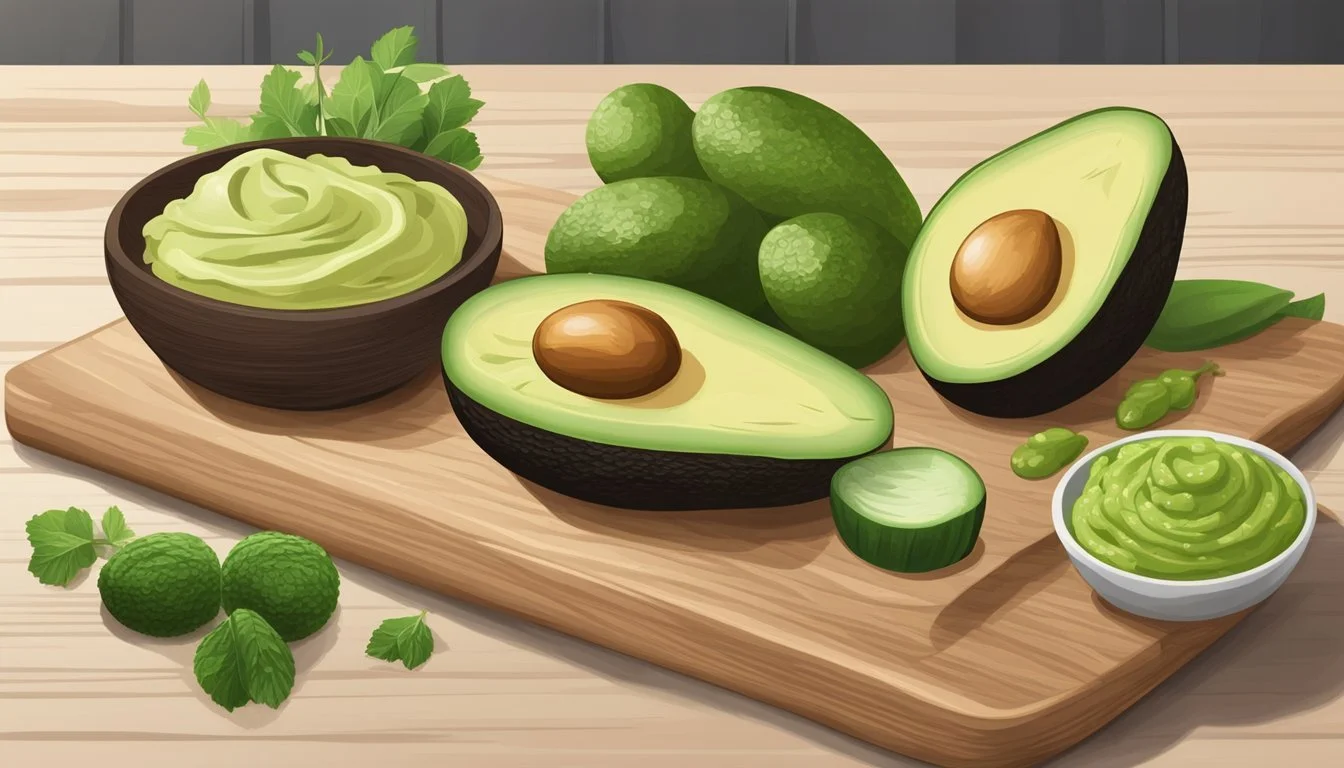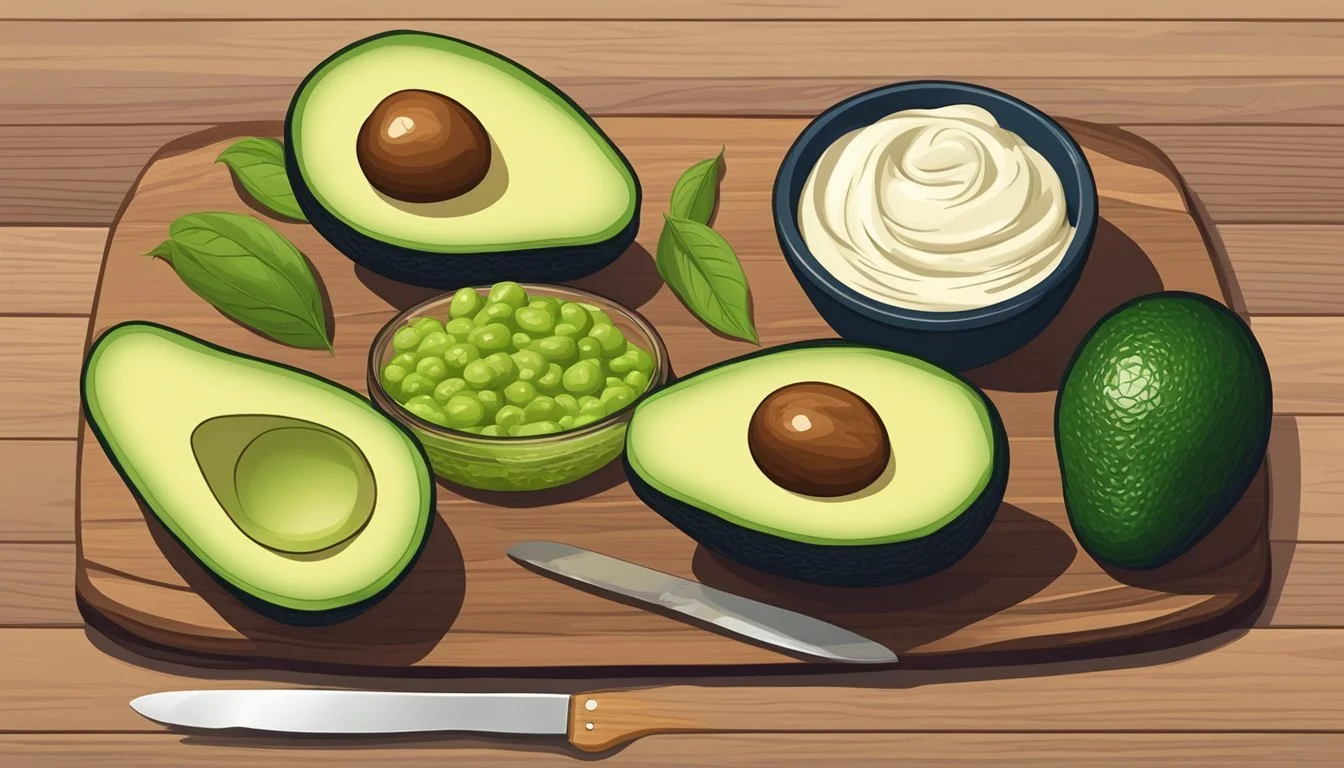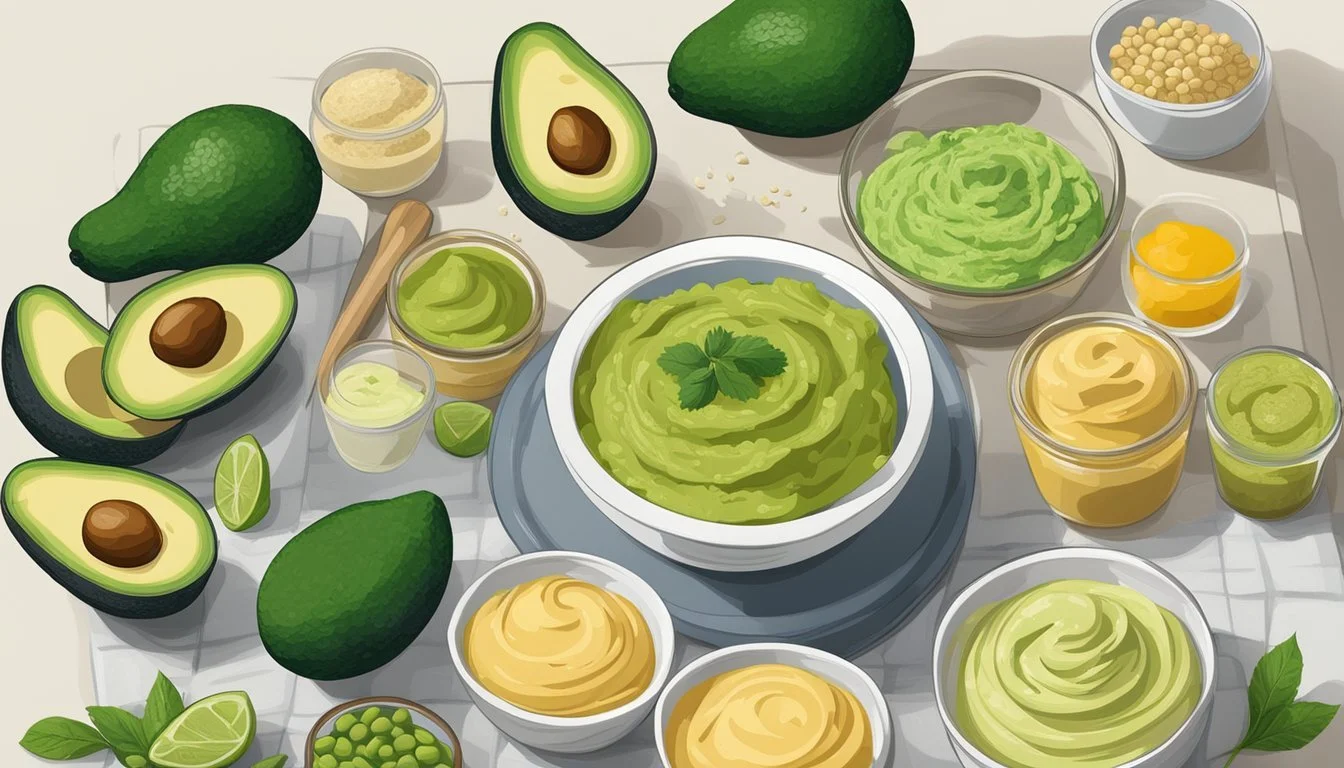Avocado Substitutes
Top Alternatives for Your Recipes
Avocado has become a staple ingredient in many kitchens, lauded for its creamy texture and healthy fats. However, there are various reasons someone might look for an alternative, ranging from allergies and dietary preferences to simple unavailability. Fortunately, the culinary world is replete with substitutes that can mimic the texture and contribute to the nutritional value of dishes in ways similar to avocado.
Dietitians often highlight the importance of healthy fats in a balanced diet, fats that avocados are particularly known for. Substitutes such as silken tofu, nut butters, and even pureed fruits like bananas can offer comparable creaminess and beneficial fats, along with a range of vitamins and minerals. These alternatives are not just second-best options; they are versatile ingredients that can enrich a diet with new flavors and nutritional benefits.
Each substitute has its unique profile that can complement or even enhance a variety of recipes. For example, puréed beans can bolster the protein content of a dish, while a spread like pesto can bring a vibrant flavor and oily texture akin to mashed avocado. These alternatives offer flexibility in the kitchen, ensuring that those who cannot or choose not to eat avocados still have an array of options to maintain a nutritious and satisfying diet.
Understanding Avocado Alternatives
Avocado substitutes can provide different nutritional profiles, flavors, and health benefits. This section examines key aspects to consider when selecting an alternative.
Nutritional Value Comparison
Avocado is renowned for its high levels of healthy fats, namely monounsaturated fats and omega-3 fatty acids. When considering substitutes, one can compare similar nutrient contents. Silken tofu and cashew nut butter, for instance, offer a good amount of protein and healthy fats. The inclusion of nuts like pistachios or cashews not only contributes to the texture but also offers vitamins and minerals, including iron, potassium, and magnesium.
Nutrient Comparison Table:
Nutrient Avocado Silken Tofu Cashew Nut Butter Beans Healthy Fats High Moderate High Low Protein Low High Moderate High Fiber High Low Moderate High Vitamins/Minerals Vitamin K, Lutein, Folate Iron, Calcium Iron, Potassium, Magnesium Folate, Iron, Potassium
Taste and Texture Similarities
Avocado is unique for its creamy consistency and subtle, buttery flavor. Ripe, mashed bananas can mimic the creaminess of avocado in recipes at a 1:1 ratio although they contribute a sweeter taste, which may not always be desirable. Greek yogurt, while not plant-based, is also a texture-appropriate alternative for avocado, especially in dips or spreads.
Health Benefits of Substitutes
Substitutes for avocados like raw seeds and nuts bring their own health benefits to the table. Raw seeds such as pumpkin, hemp, and chia are higher in protein compared to avocados and provide antioxidants and fiber that contribute to a feeling of fullness. These substitutes, while not duplicating the exact nutritional profile of avocados, still offer a variety of nutrients and their own distinctive health advantages. For example, nuts are rich in vitamin E, an important antioxidant, and seeds like chia are a good source of minerals, including iron and magnesium.
Alternative Options By Context
When searching for an avocado substitute, it's essential to consider the context of its use. Different substitutes may be more appropriate depending on whether the avocado's role is as a spread, a key ingredient in salads, for cooking, or in baking recipes.
For Spreads and Dips
The creamy texture and rich taste of avocado make it a preferred base for spreads and dips. Substitutes in this category aim to mimic that creaminess:
Nut Butters: Cashew and almond butter offer a comparable creaminess and can be thinned with a bit of olive oil if necessary.
Hummus: Chickpeas blended with tahini, olive oil, and lemon juice create a spread with a similar consistency.
Edamame Dip: Pureed edamame with a dash of olive oil serves as a protein-rich, vibrant alternative.
Tahini: This sesame seed paste provides a nutty flavor and silky texture suitable for spreading.
In Salads and Bowls
Avocado adds a luxurious texture and a nutritional punch to salads and bowls. Here are fitting substitutes:
Seeds: A sprinkle of sunflower or pumpkin seeds offers a crunch and dose of healthy fats.
Greek Yogurt: Its thick, cream-like texture dresses salads well, while providing a protein boost.
Cashew Cream: Can be drizzled over salads for added richness.
Beans: Mashed or whole beans like pinto or black beans contribute a satisfying texture and fiber.
As Cooking Ingredients
In cooked dishes, avocado's role can often be replaced with ingredients that bring similar properties:
Olive Oil: Offers a healthy fat substitute for avocado oil, contributing a similar richness to dishes.
Silken Tofu: Blends smoothly into sauces and soups, mimicking avocado's creamy texture.
For Baking and Desserts
Avocado is utilized in baking for its moisture and fat content. When a substitute is needed, these options can be incorporated:
Mashed Bananas: Provide moisture and can act as a binder, much like avocado.
Pumpkin Puree: Also offers moisture and creates a smooth texture with a subtle flavor that's perfect for desserts.
Butternut Squash: When cooked and mashed, it can serve as a nutrient-dense substitute with a mildly sweet taste.
Popular Avocado Substitutes
Avocado substitutes can be categorized based on nutrient profiles and textural similarities. When seeking alternatives, consider options that offer the creamy consistency and health benefits that avocados provide.
Nut and Seed Butters
Nut butter like almond butter and cashew butter serve as excellent substitutes, especially in sandwiches or dressings, due to their creamy texture and healthy fat content. Peanut butter is another viable option, though it has a more distinctive flavor. Additionally, seeds such as chia and hemp seeds can be incorporated into meals for a nutritional boost, with hemp seeds offering a pleasant, nutty crunch.
Almond Butter: mild flavor, pairs well with sweet and savory.
Cashew Butter: rich, creamy, useful in vegan recipes.
Peanut Butter: distinct taste, best for sandwiches and sauces.
Chia Seeds: gel-like when soaked, good for smoothies.
Hemp Seeds: add to salads for a subtle crunch.
Legumes and Beans
If someone’s looking for a heartier texture, legumes and beans like chickpeas, pinto beans, and edamame can work as fillings and spreads. They are high in protein and fiber, thereby contributing to the satiety factor that one often finds in avocados. Silken tofu, while not a legume, is a soy-based alternative that mimics the smooth texture of avocados in vegan desserts and dressings.
Chickpeas: great for making hummus, loaded with fiber.
Pinto Beans: mash for a textured spread, rich in folate.
Edamame: blend into dips, source of whole-food protein.
Silken Tofu: versatile, blends smooth for creamy textures.
Vegetable and Fruit Options
Certain vegetables and fruits offer the creaminess or color that avocados provide in a dish. Mashed banana can replace avocado in smoothies and baking, while cucumber slices mimic the freshness in sandwiches. Spinach and pumpkin puree are healthy fill-ins for dips and spreads, where the consistency is more important than identical flavor profiles.
Banana: sweet substitute, excellent in smoothies and desserts.
Cucumber: fresh, watery crunch for a twist on sandwiches.
Spinach: nutrition-packed green for smoothies and dips.
Pumpkin Puree: smooth and mildly sweet for baked goods.
Dairy and Non-Dairy Alternatives
For those open to dairy, Greek yogurt offers a creamy texture along with additional protein, making it a fitting substitute in smoothies and sauces. In the non-dairy realm, apart from the aforementioned silken tofu, dairy-free butters made from nuts are key options for those seeking a similar mouthfeel to that of avocados.
Greek Yogurt: provides creaminess and tang to dishes.
Nut Butters: dairy-free, full of healthy fats and versatile in use.
Special Considerations
When considering avocado substitutes, it is crucial to address specific needs such as allergies, dietary restrictions, and the environmental impact associated with alternative ingredients. This section will briefly explore these aspects to provide a comprehensive understanding.
For Those with Allergies
Individuals with allergies must carefully select substitutes to avoid allergic reactions. Silken tofu is a common alternative, providing a similar texture to avocado, but those with soy allergies should avoid it. Nuts like cashews and pistachios offer creamy consistencies and healthful fats but are not suitable for those with tree nut allergies.
Safe options for those with common food allergies include:
Pinto beans
Hearts of palm
Blanched asparagus spears
Dietary Restrictions and Health Conditions
Substitutes should align with dietary needs, such as veganism or specific health conditions that may require low-inflammatory foods or particular nutritional values. Greek yogurt is praised for its creamy texture but is not vegan. On the other hand, edamame dip can serve as a health food option for vegans, providing essential amino acids and nutritious fats.
Relevant substitutes for various dietary restrictions:
Vegan: Edamame dip, Pestos without cheese, Cashew nut butter
Inflammatory health conditions: Opt for substitutes like raw seeds that are known for anti-inflammatory properties
Sustainability and Environmental Impact
Sustainability is another critical factor when selecting avocado substitutes. Avocados have a significant water footprint and can contribute to deforestation. Environmentally-conscious consumers might prioritize alternatives with a lower environmental impact. For instance, local and seasonal produce can be a more sustainable choice, reducing the carbon footprint associated with transportation and supporting local ecosystems.
Consider the following for lower environmental impact:
Choosing local seeds like pumpkin, hemp, or chia seeds as low-carb alternatives
Opting for substitutes grown with sustainable agricultural practices
Creative Usage in Recipes
Exploring avocado substitutes opens a myriad of culinary possibilities, from reinvented guacamoles to desserts with a twist. These creative adaptations allow for the retention of texture and nutrition while providing a new dimension of flavor to traditional dishes.
Avocado-Free Guacamole Variations
Guacamole typically hinges on the creaminess of avocados, but substitutes can fill the gap while preserving its signature texture. Edamame dip, mashed with lemon juice and spices, can mimic the feel and taste of traditional guacamole. For a unique take, try blending green peas with olive oil and garlic for a similar consistency and the vibrant green color guacamole is known for.
Innovative Salad Toppings
Salads benefit from the creaminess and vitamins that avocados usually provide. Substitute with cubes of silken tofu or chunks of hearts of palm to maintain the nutritional profile without compromising on texture. For a crunchy addition, sprinkle salads with toasted pine nuts or slivered almonds to infuse a nutty flavor with added fibers.
Customizing Smoothies and Breakfast Dishes
For a rich smoothie or a fulfilling breakfast bowl, avocados are often sought for their smooth texture. Using ripe bananas can offer both creaminess and natural sweetness, eliminating the need for additional sugar. Oatmeal can be topped with a dollop of cashew nut butter for a boost of healthy fats in place of avocado slices.
Non-Avocado Bases for Desserts
Avocado acts as a creamy, fiber-rich base in many desserts. Swap it for mashed bananas or a dark chocolate and macadamia blend to achieve a similar richness without the avocado. For cheesecakes or creamy desserts, soft cheese varieties such as manouri can provide the necessary texture alongside an indulgent taste.
Tips for Selecting the Best Substitute
When seeking an avocado substitute, texture and taste should be primary considerations. A good alternative should mimic the creamy texture of a ripe avocado and offer a satisfying mouthfeel. For instance, silken tofu and Greek yogurt provide a similar creaminess which can be preferable in smoothies and dips.
In terms of health benefits, a dietitian may recommend substitutes that align with specific nutritional goals. While no substitute can wholly replicate an avocado's unique nutrient profile, many can offer a variety of vitamins and minerals. Here, nutrition comes into play—selecting seeds and nuts like soaked pistachios or cashews can provide healthy fats and proteins.
For the best culinary experience, consider the ripeness of the avocados being replaced. Use just ripe bananas in a 1:1 ratio, but when using well-ripened bananas, reduce the volume to ¾ to prevent excess sweetness. When replacing avocados in savory dishes, heart of palms and blanched asparagus spears can offer a similar texture with a neutral taste, maintaining the balance in the dish.
Finally, an array of substitutes is suitable for those with dietary restrictions. Edamame dip, for example, is a soy-based option that provides protein and is suitable for vegetarians. Pesto can serve as another rich and moist option that aligns with many dietary needs.
In the later table, one can find suitable substitutes depending on the intended use:
Intended Use Substitute Texture Taste Spreads & Dips Silken tofu, Edamame dip Creamy Neutral Baking Bananas, Cashew nut butter Moist Sweet/Nutty Salad Toppings Greek yogurt, Pesto Thick Tangy/Rich General Creaminess Cashews, Pinto beans Smooth Mild
By considering these factors, one can confidently select the best avocado substitute for any culinary creation.





